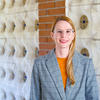Caring Conductor
When COVID-19 hit in early 2020, choral singing went from a celebrated art form to a dangerous superspreader event, a change that presented Shannon Arnold, BYR ’19, with a tricky situation.
When COVID-19 hit in early 2020, choral singing went from a celebrated art form to a dangerous superspreader event, a change that presented Shannon Arnold, BYR ’19, with a tricky situation.

Photo by Curt Leimbach
I wouldn’t have had the confidence or skills to get this position if not for Temple. If I’d tried to apply for the job without the guidance of my professors, there’s no way I would’ve made it to this status at my age.”

As the new artistic director for the Fort Myers Symphonic Mastersingers, Arnold found herself in charge of a renowned 80-person ensemble just as the pandemic was beginning to spread.
“About two months into the shutdown, I was like, ‘I can’t not sing, I can’t not be with choirs, I’ve got to figure out how to make this work!’” she remembered. “I knew I couldn’t live without music, and knew my singers couldn’t either.”
While other community choirs turned to Zoom, Arnold intuited that the online video platform wasn’t right for her choir’s older “snowbird” population, and feared they’d lose members if they went fully virtual.
Because research showed that outdoor gatherings were safer, Arnold chose to host in-person rehearsals outdoors with social distancing precautions and constant masking.
“I take pride in the fact that my choir sang all of last season together and we had no cases of COVID,” Arnold said. “So many singers thanked me, because it was the only thing that felt somewhat normal for them.”
Amid this progress, she’s observed a shift among the ensemble’s members. As the youngest person in the room, at first some of the singers seemed a bit skeptical of her. Arnold says the pandemic helped change that.
Two major factors attracted Arnold to Temple: the school’s diversity and the caliber of the faculty.
She admired Professor Mitos Andaya Hart as one of the relatively few female conductors in the field.
“I still go to her for advice on things like balancing motherhood with work life,” Arnold said. “And she’s a genius!”
She also appreciated how Professor and Chair of Vocal Arts Paul Rardin encouraged community over competition among the close-knit choral conducting cohort.
“Dr. Rardin set a standard that it’s not about who’s better—it’s about growing together,” she noted. “He really cared about us, and that made a huge difference.”
College: Boyer College of Music and Dance
Degree: MA, choral conducting, 2019
Industry: Community music
Hometown: Lancaster, Pennsylvania
As Arnold enters a new season with the choir, she’s making her mark on the organization.
She’s recorded virtual concerts to share the group’s hard work, and has diversified their songbook with more work by female composers and composers of color.
And she continues her work with the Intermezzo Choir, a group she founded in January 2020—with the coordination of certified music therapist Jan Ackley Malecha—for singers diagnosed with dementia and Alzheimer’s disease. The choir is the only one of its kind in the region, providing the opportunity to sing for the area’s afflicted aging population. While Intermezzo turned to Zoom for rehearsals during the height of the pandemic, the connection among its members remains palpable.
“Music is so good for people who are suffering, it’s one of those things that helps stimulate their minds,” Arnold said. “Intermezzo is all about community, and having a good time making music, and I think it’s really making a difference in the singers’ lives.”
“The fact that we’re able to do anything at all [throughout the pandemic] sped up the process of them trusting me,” she said. “This season, they’re all in, and they see me as part of this organization, not an outsider.”